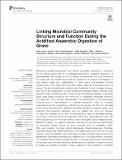Linking microbial community structure and function during the acidified anaerobic digestion of grass
Abstract
Harvesting valuable bioproducts from various renewable feedstocks is necessary for the critical development of a sustainable bioeconomy. Anaerobic digestion is a well-established technology for the conversion of wastewater and solid feedstocks to energy with the additional potential for production of process intermediates of high market values (e.g. carboxylates). In recent years, first-generation biofuels typically derived from food crops have been widely utilised as a renewable source of energy. The environmental and socioeconomic limitations of such strategy, however, have led to the development of second-generation biofuels utilising, amongst other feedstocks, lignocellulosic biomass. In this context, the anaerobic digestion of perennial grass holds great promise for the conversion of sustainable renewable feedstock to energy and other process intermediates. The advancement of this technology however, and its implementation for industrial applications, relies on a greater understanding of the microbiome underpinning the process. To this end, microbial communities recovered from replicated anaerobic bioreactors digesting grass were analysed. The bioreactors leachates were not buffered and acidic pH (between 5.5 and 6.3) prevailed at the time of sampling as a result of microbial activities. Community composition and transcriptionally active taxa were examined using 16S rRNA sequencing and microbial functions were investigated using metaproteomics. Bioreactor fraction, i.e. grass or leachate, was found to be the main discriminator of community analysis across the three molecular level of investigation (DNA, RNA and proteins). Six taxa, namely Bacteroidia, Betaproteobacteria, Clostridia, Gammaproteobacteria, Methanomicrobia and Negativicutes accounted for the large majority of the three datasets. The initial stages of grass hydrolysis were carried out by Bacteroidia, Gammaproteobacteria and Negativicutes in the grass biofilms, in addition to Clostridia in the bioreactor leachates. Numerous glycolytic enzymes and carbohydrate transporters were detected throughout the bioreactors in addition to proteins involved in butanol and lactate production. Finally, evidence of the prevalence of stressful conditions within the bioreactors and particularly impacting Clostridia was observed in the metaproteomes. Taken together, this study highlights the functional importance of Clostridia during the anaerobic digestion of grass and thus research avenues allowing members of this taxon to thrive should be explored.
Citation
Joyce , A , Ijaz , U Z , Nzeteu , C , Vaughan , A , Shirran , S L , Botting , C H , Quince , C , O’Flaherty , V & Abram , F 2018 , ' Linking microbial community structure and function during the acidified anaerobic digestion of grass ' , Frontiers in Microbiology , vol. 9 . https://doi.org/10.3389/fmicb.2018.00540
Publication
Frontiers in Microbiology
Status
Peer reviewed
ISSN
1664-302XType
Journal article
Description
This research was funded by the Irish Higher Education Authority Program for Research in Third Level Institutions Cycle 5: – PRTLI-5 ESI Ph.D. ENS Program. This work was also supported by the Wellcome Trust (grant number 094476/Z/10/Z for the TripleTOF 5600 mass spectrometer at the University of St Andrews), NERC (grant number NE/L011956/1), and a Royal Irish Academy Mobility Grant.Collections
Items in the St Andrews Research Repository are protected by copyright, with all rights reserved, unless otherwise indicated.

